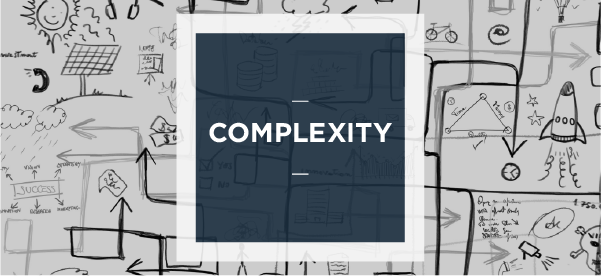Life during a pandemic is extraordinarily complex. Processes, rituals, and daily habits we once took for granted have been sabotaged by complications and changes invariably leading to more complications and changes. That complexity – the addition of multiple interconnected parts into our daily lives – can be challenging on many levels. New information may be incomplete or not completely understood, and the sheer volume is often overwhelming or taxes limited resources.
Imagine running a business during a pandemic – your employees and clients are affected in ways too varied to grasp, from child care/schooling issues to health concerns to loss of loved ones. The ongoing needs of your business were already demanding; now they are amplified and multiplied by the complexity of the pandemic. People are getting sick, government regulations are repeatedly created and revised as information changes, and the economy makes mega-rollercoasters look like kiddie rides.
Well, most of us don’t need to imagine that … we can look at the past year and know it to be true. As leaders, many of us have also found these times to be challenging. However, with all due respect to the suffering and loss so many have experienced due to the pandemic, this complexity has served many leaders as a great clarifier. These leaders have leaned into the complexity with care and interest, tapping into their creative competencies of relating with others and achieving objectives, tasks and goals.
The reductionist framework preferred by many leaders has far too many limitations. Our brains crave simple decision-making, especially in times of stress, and thus we fall into the trap of converting the complex into the simple with binary thinking, reactive tendencies and worse yet, disengagement. While keeping it simple is a great rule of thumb in some areas, as leaders we must match the complexity of our development to the complexity of our environment if we want to be truly effective in more significant work.
American developmental psychologist and author Robert Kegan, in his Theory of The Evolution of Consciousness, wrote, “When we experience the world as ‘too complex’ we are not just experiencing the complexity of the world. We are experiencing a mismatch between the world’s complexity and our own at this moment.” There are only two logical ways to mend this mismatch: reduce the world’s complexity or increase our own.
I sense that Kegan is suggesting that there is really one mend within the scope of our direct influence, and that is to increase our own complexity through more complex development.
Considering the development of vaccines during the pandemic, complex systems were engaged along with a willingness for intelligent risk-taking by “breaking” many of the FDA’s existing rules and guidelines. A great deal of complexity was in play and new, innovative approaches didn’t simplify the matter. The need to accelerate results did not make the goal easier. Rather, the complexities were ‘leaned into’ by quickly developing the abilities of resources (mostly combining other expertise, laboratories, and shifting priorities and dollars).
The approach was restructuring, bringing people together who were aligned with one goal (develop and administer an effective vaccine)and one common enemy (the virus). Resources were amassed to address the complexity, and the goal is being met. As I write this, I am now eligible for the vaccine, as nearly everyone will be in the coming weeks. I am hopeful that the complexity of the situation we have been navigating this past year is dissipating.
At Emergent, we’d like to engage with you as you lead in complex situations and environments. Recently, a client said to me “much of your work is in the gray, isn’t it?”. What he was suggesting was that the work we do at Emergent is often complex as there are many moving parts and most of all, human development is a very complex and rich subject.
We’d like to work in the gray with you… let me know if I can serve you and your leadership!

Comments (1)
Thanks Bill. Very important distinction for leaders to grok at this time. All times really but most critical as we emerge into whatever will happen next. Resilence…